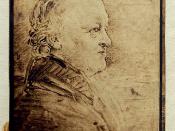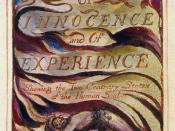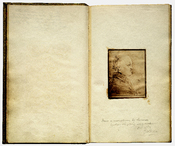William Blake's works include many of which relate to the role and interest of many figures of children and caretakers who appear in Songs of Innocence and Experience. The poems I will be discussing in this thesis are, from the Songs of Innocence: 'The Little Girl Lost,' 'The Little Girl Found' and 'The Chimney Sweeper.' All of which show caretakers in a good light. The other poems, from The Songs of Experience: 'The Chimney Sweeper,' 'NURSE'S Song' and 'Infant Sorrow' all depict caretakers in a bad light.
The first poem I will discuss is from the Songs of Innocence, its title is 'The Little Girl Lost.' This poem tells the story of a seven-year old child who becomes separated from her parents and is lost in a wild kingdom.
In the first stanza the author prophasizes the future, foretelling of a serious situation. William Blake then goes on in the poem to tell about how the young girls parents react to the new knowledge that their daughter is missing.
The parents are fearful because they know the dangers of the jungle their daughter is lost in. The parents, caretakers, of the young girl can not conceive the possibility that the jungle may have a soft and caring side.
We then find out the age of young Lyca, 'seven summers old.' At the age of seven, a young girl must be very scared alone in the wood with out her mother and father. William Blake also in this stanza tells how Lyca became lost in this wilderness. Lyca, being a young and playful girl had saw beautiful birds singing and had followed them into the jungle, enchanted by their song.
Lyca cannot go on. She is weary from walking and needs to lay down for a...


